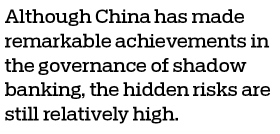Shadow banking risks should be curbed with unified regulation

Global financial supervision is being strengthened since the global financial crisis. But to make high profits, banks started circumventing the regulatory barriers and launched off-balance sheet businesses, giving rise to shadow banking.
Where there is mismatch between asset maturity and liquidity, lax supervision and information asymmetry, high leverage can easily lead to liquidity and/or systemic risks, even a financial crisis, undermining the stability of the financial market. On the other hand, the dismantling of high-risk shadow banking could help prevent major risks.
So China should implement strict regulatory rules for credit-like financial products, and strengthen supervision of innovative financial products. China's regulatory agencies have for long been seeking to unify supervision of the financial market, especially for high-risk wealth management products, and setting supervision standards for different industries.
It is especially important to treat the wealth management product market as a unified whole, and improve coordination among different regulatory authorities. But supervision should be unified and a compliance system built step by step; it should be a long-term target and aimed at reducing the cost of supervision, preventing overlapping in supervision, and improving supervision efficiency.
Filling the gaps and loopholes in the supervision of innovative financial products will help better monitor shadow banking. China's high-risk shadow banking resembles quasi-credit, and it is easy to get loans on the pretext of promoting innovation. No wonder with the development of China's financial market, innovative financial products have been emerging at a faster pace.
Since China formulates regulatory rules for a financial product-private equity funds for example-after it appears in the market, some individuals and institutions use the regulatory gaps in legislation to their advantage. The flexibility and high yield of private equity funds can help inject fresh momentum into the financial market, but many private asset management firms that use private equity and/or venture capital funds, even various forms of private financing operate outside the law, entailing different micro and systemic risks.
Therefore, China should introduce a collective investment plan to maximize legalization, and standardize private equity funds, private collective financing methods and new financial products to make up for the legislation gap, fill the loopholes in the supervision of innovative financial products and eventually realize sound, healthy and stable development of the financial market.
But since high-risk shadow banking cannot be eliminated overnight, China should learn from the horizontal regulation of financial services of the United Kingdom, Japan, the Republic of Korea and other countries to check shadow banking.
Moreover, since unifying the regulatory system is a major reform that cannot be achieved in the short term, China should use the introduction of collective investment plan as a catalyst to help establish and improve China's financial products and financial services legal system.
China has different types of collective financial products, and faces the problems of unclear regulatory responsibilities, unclear legal nature of products, vague definitions of legal relationships, which trigger disputes and make it difficult to protect consumers' rights.
The introduction of the collective investment plan, which will cover all financial products, should also help unify market access rules, transaction rules, information disclosure rules, persuasion rules and financial consumer protection rules, thus laying a solid foundation for the legal system for financial services.
Although China has made remarkable achievements in the governance of shadow banking, the hidden risks are still relatively high. There is a need therefore to stay alert to the new variants of shadow banking and the resulting resurgence of risks. There is also a need to bring new financial products operating beyond the realm of law into the regulated market, unify the regulation system, establish rules for credit-like financial products, and better regulate innovative financial products.

Yang Dong is director of the Research Center of Financial Technology and Internet Security, National Academy of Development and Strategy, Renmin University of China; and Sha Han is an associate researcher at the same institute.





















